Whether you’re a new business or have been in business for several years, getting more ecommerce sales will benefit your company.
Unfortunately, businesses go through plateaus and declines.
These things happen, but don’t get discouraged.
If you’re having trouble coming up with new ways to get more customers and increase revenue, we can give you some pointers.
Your previous methods may have worked at one point, but eventually, the same old strategies can grow stale.
It’s essential your business is constantly keeping up with new trends.
Consumer habits have changed, especially in the ecommerce industry.
As marketing experts, we’ve analyzed these trends and come up with a list of tips that will actually work.
11 Steps to Boost Ecommerce Sales
Here’s the best way to generate more sales on your ecommerce site:
- Target your existing customers
- Display icons that show your site is trustworthy
- Use video demonstrations
- Use photos when you include customer testimonials
- Recognize your customers want to shop from their mobile devices
- Offer more discounts
- Showcase your top selling items
- Ramp up promotions for the holidays
- FOMO (fear of missing out)
- Accept different payment options
- Focus on your value proposition
Step 1 – Target your existing customers
When businesses have trouble growing, they immediately think it’s because they don’t have enough customers.
This is a common misconception, so don’t jump to conclusions.
Instead of focusing all your effort on customer acquisition, you should improve your customer retention strategy.
Look at the impact loyal customers have on an ecommerce site:

Compared to new customers and customers who only made one purchase on your website, loyal customers:
- add more items to their shopping carts
- have a higher conversion rate
- generate more revenue each time they visit your site
Don’t get us wrong.
Obviously, it’s great for your business if you can keep getting new customers.
But that’s a more expensive marketing strategy.
It’s much more cost efficient to go after your existing customer base.
Why?
These people are already familiar with your brand.
They know how to use your products, and there’s no learning curve.
So focus on ways to improve their experience.
Try to come up with a customer loyalty program that gives people an incentive to spend more money each time they shop.
Each dollar spent can translate to a rewards point.
When a customer accumulates a certain number of points, they can redeem them for discounts or other promotions.
Step 2 – Display icons that show your site is trustworthy
Nobody will want to shop on your ecommerce site if it appears sketchy or otherwise untrustworthy.
One of the first things you need to do is make sure your website is secure.
Check out this example from Foot Locker:
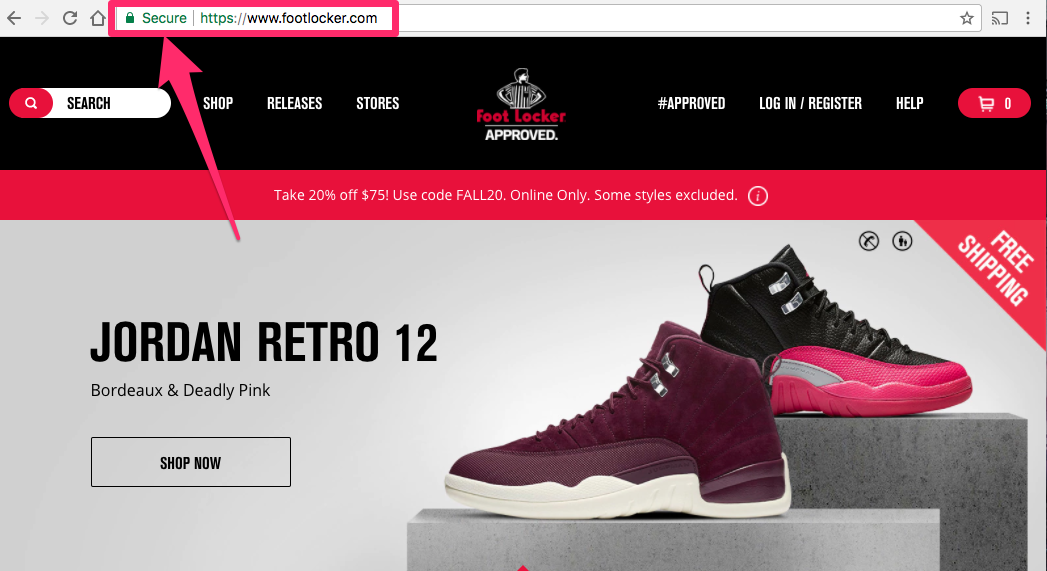
Cyber security is a major concern for shoppers these days.
In the last five years, 47% of Americans have been the victims of credit card fraud.
Security of their information is a priority for online shoppers.
You need to recognize this and make the necessary adjustments.
But what can you do to prove you’re trustworthy?
Proudly display any security badges your website is using.
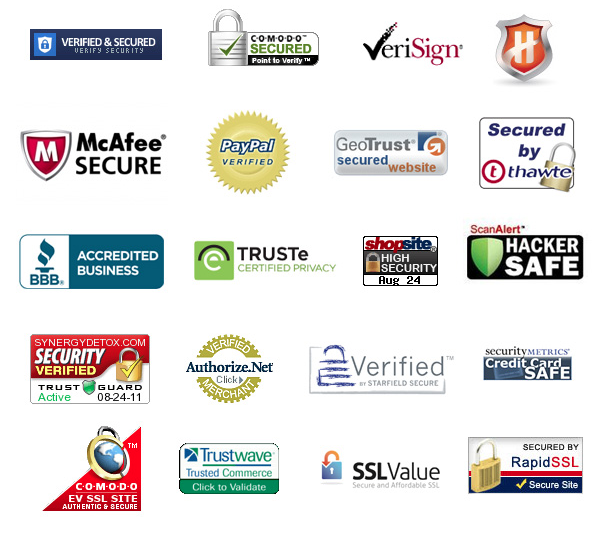
These are some examples of popular choices.
We know this should go without saying, but we want to be clear. Make sure you’re not lying or misleading your customers.
Don’t just go slapping these badges all over your website unless you actually have a relationship with these companies.
Otherwise, you can find yourself in some legal trouble as well.
Which one of these security measures is the best?
We don’t want to talk about performance, but we can tell you which one speaks to customers the most.

Norton Antivirus won by a landslide in terms of public perception.
So if you’re using Norton and don’t have the badge displayed, you need to change that as soon as possible.
For those of you shopping for new potential website security providers, it’s not a bad idea to check them out as a top consideration.
Step 3 – Use video demonstrations
Consumers love videos.
In fact, 83% of marketing experts across the globe say that video has given them a good return on investment.
Websites that have videos on a landing page can increase conversions by 80% or more.
In addition, videos do as well as ads.
This creates an increase in engagement as well as interest in whatever you’re trying to sell.
Videos resonate more with people, so it’s likely that they’ll remember what they watched as opposed to just reading about it.
What’s a reasonable way to include relevant videos on your ecommerce site?
Create product demonstrations like Nato does with their smart mount:
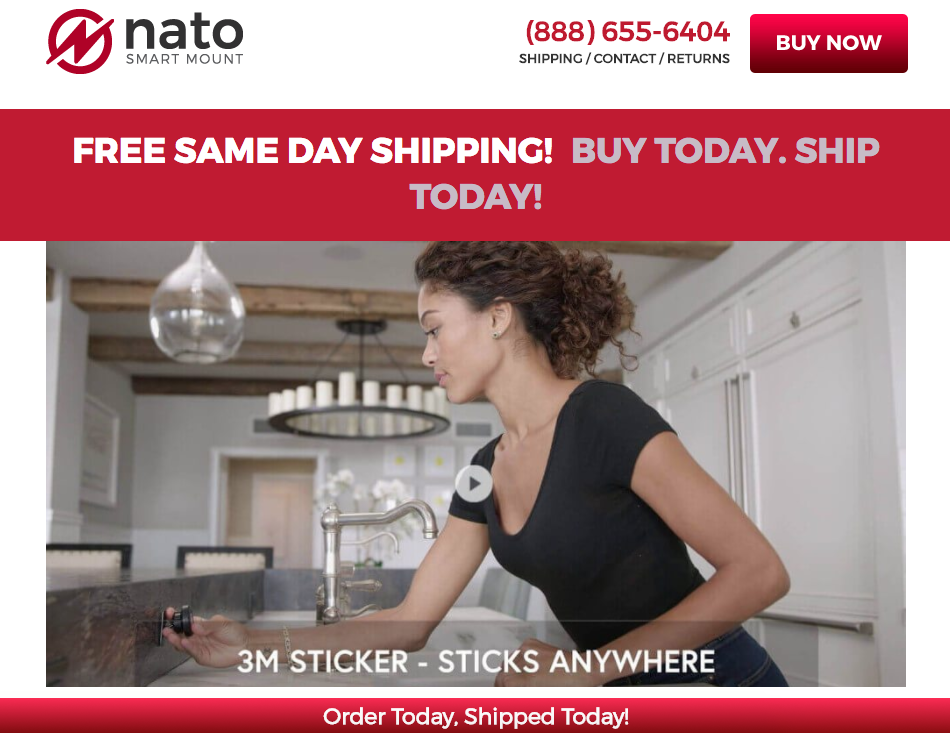
The video shows users how they can use this product in their daily lives.
Their website explains that the mount works for smartphones, tablets, GPS devices, and lightweight laptops.
Listing this is one thing, but showing customers how it works through video demonstrations is much more effective.
The video shows a demonstration of the product in the kitchen, car, bedroom, boat, office, and even bathroom.
So it appeals to a wider range of people.
This strategy won’t necessarily work for all products.
For example, if you’re selling a shirt, you won’t need to demonstrate how to put on a shirt.
But if there’s something special about your clothing in terms of usage and functionality, a video is a great way to convey that message.
It’s also an ideal strategy for ecommerce sites selling new products that may be unique or creative.
Step 4 – Use photos when you include customer testimonials
User reviews and testimonials are a great way to show proof of concept.
But a message from some nameless and faceless person isn’t really that convincing.
Take your testimonials one step further.
Add a photo and include the person’s full name and title (if relevant to your product).
Here’s a great example from Pangea Organics:
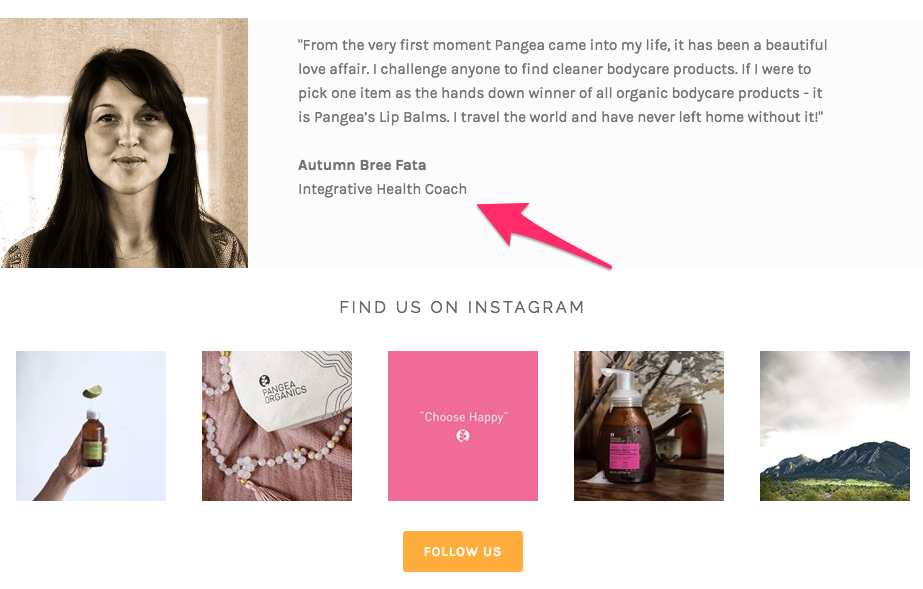
Autumn Bree Fata is an integrative health coach, so her title provides some authority and tells us she knows something about this product.
Including a picture of her face shows she’s a real person and not just somebody you made up.
What do you think looks better and more professional?
The example above or:
“This product is great!” – Daniel L.
It’s obvious. The example from Pangea Organics will resonate more with the people visiting your website.
This testimonial can encourage others to make a purchase and drive more sales.
Here’s another example from Naturally Curly:
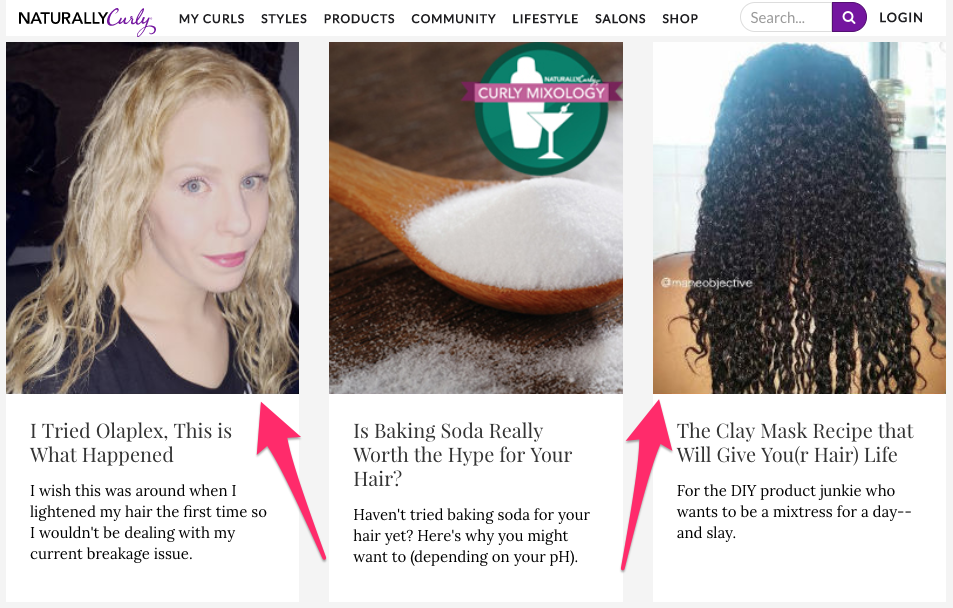
This ecommerce store sells beauty products designed specifically for customers with curly hair.
Their website allows users to share their stories and include pictures as well.
If your product is solving a problem, customers will be happy to share their stories.
We’ve explained before how storytelling can engage and persuade people.
Combining storytelling and photographs with your testimonials will help drive more sales on your site.
Step 5 – Recognize your customers want to shop from their mobile devices
Just because you have an ecommerce website doesn’t mean you can assume your customers are shopping only from their computers.
The reality is that people use mobile phones and tablets to shop online.
Research shows that mobile commerce makes up 31% of all US retail ecommerce sales.
Furthermore, 80% of millennials shop on their phones.
These numbers can’t be ignored.
Make sure your website is optimized for mobile devices.
If your site isn’t mobile friendly, it will turn potential sales away.
For those of you without an optimized mobile site, it could be one of the reasons you’re seeing a decline in sales.
We’d make that a top priority on your to-do list.
Something else you can consider is building a mobile app.
Look at why customers prefer apps compared to a mobile website:

All these reasons make things easier for the customer.
Improving the customer experience will help you get more sales and increase your revenue.
Find a way to focus on what customers want.
- Convenience
- Speed
- Saved preferences and settings
- Benefits and rewards
- Personalization
- Entertainment
If your website, mobile site, and mobile application can provide these benefits, you won’t have an issue getting more sales.
Step 6 – Offer more discounts
It may sound simple, but not enough companies are offering discounts to their customers.
If you’re worried about your profit margins, just use a marketing strategy that’s as old as time.
Jack up the base price of each product and then put it on sale.
It’s simple.
Take a look at this example from Express:
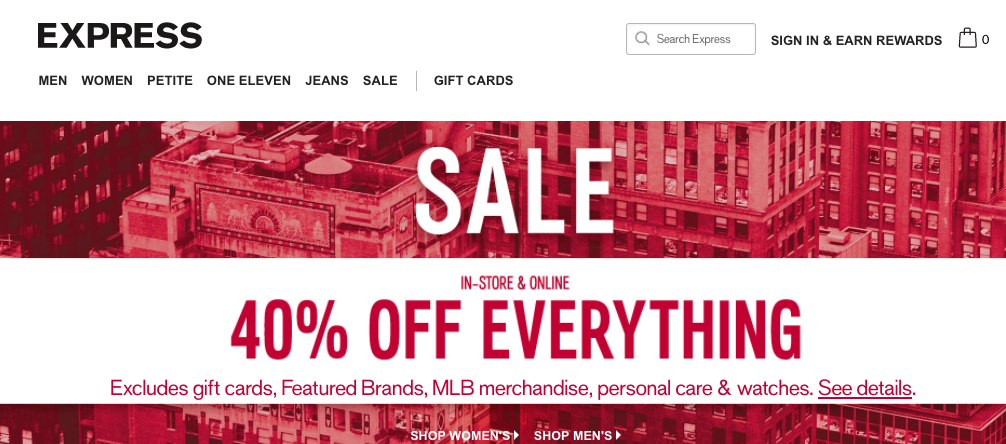
They are offering 40% off everything on their website.
So many times we’ll see websites offer “up to” a certain percent off “select items.”
Sure, that works too.
But that’s nothing compared to 40% off everything site wide.
Everyone loves getting a good deal, so this is a great way to drive sales.
Step 7 – Showcase your top selling items
Give your customers some direction.
Show them what people are buying the most.
We like it when websites include a “best seller” category on the homepage.
Not everyone browsing your site will know exactly what they’re looking for.
If your company sells a wide range of different products, it can be overwhelming, especially for a new customer.
When someone stumbles upon your site, they may get drawn to products that are popular.
You can also take this opportunity to promote products with the highest margins.
Even if they aren’t actually your top sellers (nobody needs to know that), you can put them on your homepage.
In a perfect world, your top selling products are also your most profitable products, so try to make that happen if you make adjustments to increase profit margins.
Step 8 – Ramp up promotions for the holidays
Special events are a time when people are looking to shop and spend more money than on a normal day of the year.
That’s why we always tell ecommerce sites to actively promote holiday sales.
You’ve got a small window of opportunity to get massive sales during these events.
Take a look at these statistics for ecommerce sites during cyber week:
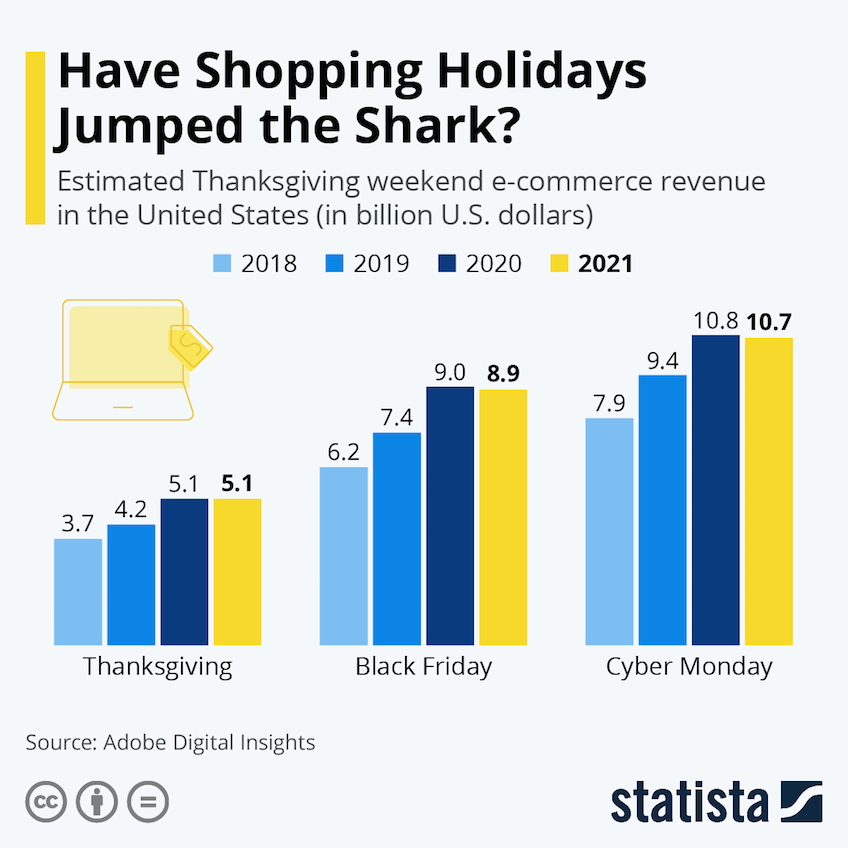
So break out your best offers during this time of year.
The shopping malls are packed, so it’s more convenient for consumers to shop from home.
Use that to your advantage.
We said this earlier, but here’s another opportunity for you to target your current customers.
Send out emails to your subscriber list to entice them to buy during the holiday season.
Keep in mind people are buying gifts for friends and family as well as themselves.
Promote your products accordingly.
Market items as “the perfect gift” or “the best ways to show someone you care.”
Phrases like that should do the trick.
Step 9 – FOMO (fear of missing out)
You’ve got to create a sense of urgency when you’re selling products on your ecommerce site.
This will get shoppers to act fast instead of waiting to complete the purchase at a later date (which they may never do).
Tell your customers you have a limited quantity of items remaining even if that’s not the case.
This strategy can get a price sensitive customer (most people) to make an impulse buying decision.
It creates a fear that if they don’t buy it now, they’ll end up spending more money later.
One way to do this is by running flash sales.
Here’s an example of something you could email your customers or put directly on your website:

This creates a sense of urgency.
The sale ends at midnight, so if the customer doesn’t act now, they could miss out on a great deal.
It’s much more effective than sending a coupon that expires at the end of the month, giving people an excuse to put off their shopping.
Make sure your marketing campaigns are actionable, and you’ll get more sales.
Step 10 – Accept different payment options
You have to give people different options to pay for the products and services on your website.
If you only accept Visa and MasterCard, you’re alienating lots of potential customers.
Make sure you have the capability to accept debit cards in addition to credit cards.
Look at this checkout page from Best Buy:
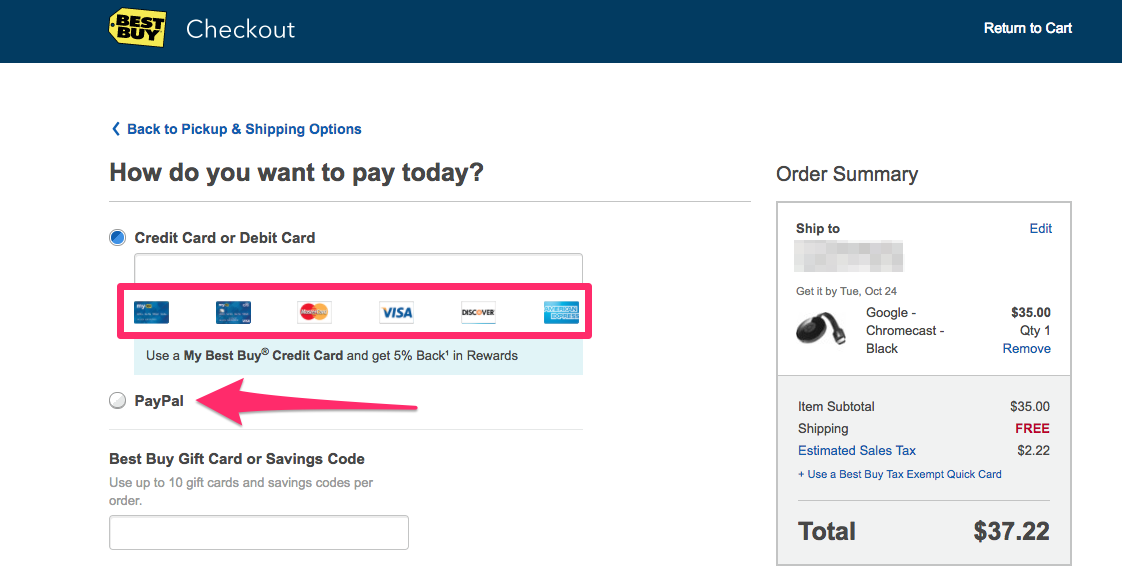
Best Buy accepts 6 different types of credit cards on their website.
They also give customers the option of paying through PayPal.
The last thing you want is a customer who wants to make a purchase but can’t complete it because you don’t take their primary payment method.
Continue to adapt to the new trends as well.
Alternative payment options such as Apple Pay are growing in popularity too.
If you have a mobile application, customers can easily pay for items via Apple Pay with just a few clicks.
Making the checkout process as simple as possible will help you get more ecommerce sales.
Step 11 – Focus on your value proposition
What does the customer see when they get to your website?
Is it your phone number?
Your company’s mission statement?
Those aren’t effective.
Instead, put more emphasis on value.
Tell your customers what separates your product from similar items on the market.
Look how effectively Square does this with their point of sale systems:
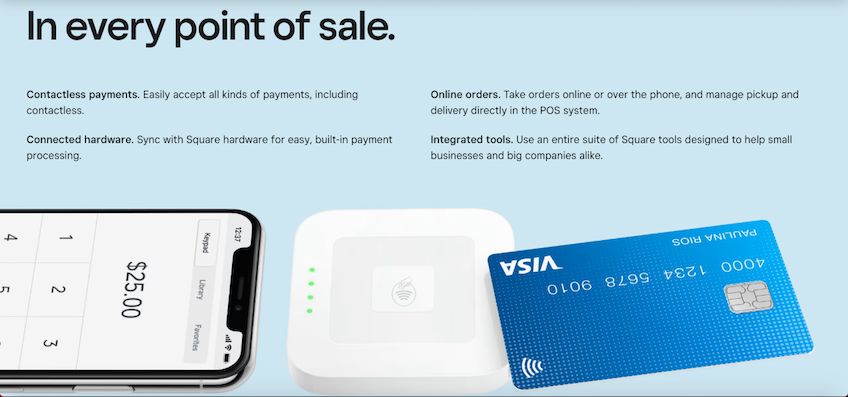
Their value proposition tells you everything you need to know about the product.
It has a headline that captures the consumer’s attention.
They include a list of their top features for customers to focus on.
Square also includes a photograph of their POS system to show customers what it looks like.
If you can create a highly effective value proposition, you’ll be able to drive more sales on your ecommerce site.
Conclusion
If sales are starting to slow down or get stagnant, it’s time for you to come up with some new and creative ways to market products and services on your ecommerce site.
Rather than trying to find new customers, focus your marketing efforts on your existing customer base.
Make sure your website is secure so customers feel comfortable entering their personal information as well as their credit card numbers.
Use video demonstrations to show customers how to use your products.
If you’re currently using customer testimonials, that’s great.
But if you want to improve those testimonials, add a photograph to them as well.
Offering lots of promotions and advertising during special times of the year, such as the holidays, can help you improve sales.
Create a sense of urgency to entice customers to make an impulse buy.
Don’t forget about mobile users. At the very least, your website needs to be optimized for mobile devices.
If you want to go the extra mile, consider developing a mobile application.
Promote your top selling items.
Come up with a unique and actionable value proposition.
These tips will help you boost sales on your website.
